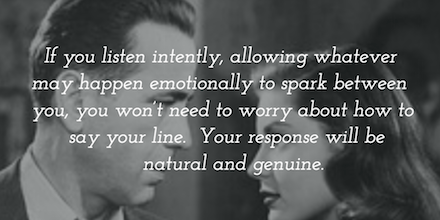We are all very good at reading subtle shades of meaning on people’s faces. We instinctively know, for instance, if someone is truly engaged, distracted or thinking about something else entirely.
[vertical_spacing height=”10″]
On stage, when you’re momentarily distracted by a technical issue or a lapse in concentration, the audience may not notice because they’re sitting many feet from the stage. But, on set, the camera records your thoughts as they flash across your face “up close and personal.” This is great if you’re prepared but if you’re busy hitting your mark or thinking about what your next line is, the camera will record the actor’s thoughts instead of the character’s. Stage actors are often unprepared for that kind of scrutiny and for the preparation and focus acting on set requires.
[vertical_spacing height=”10″]
Many stage actors I work with are preoccupied with their lines and how they will say them as if what they say is the whole of their responsibility. They give too little consideration to the thoughts they think before they speak. They listen to the other actors “intellectually,” with their ears, hearing the words without realizing that listening is connected to your gut, your groin, your heart or your throat as well as your head. Yes, listening is hearing and comprehending but it’s also “physical” and “emotional.” Actors must listen the way a deer in the woods listens.
[vertical_spacing height=”10″]
In life, as we listen to someone speak, we feel and thoughts race through our mind. While she speaks he’s thinking “Wow, she’s so hot! I’d better play it cool” and, when he speaks, perhaps she’s thinking “This guy really creeps me out.” Without saying a word, the fullness of our silence conveys our inner life. What we don’t say is at least as important as what we do say and these spontaneous, unspoken moments of connection are what the camera picks up so beautifully.
[vertical_spacing height=”10″]
In a shift of the eyes, a tensing of the jaw or the biting of a lip, the real story is being told. That’s the heart and soul of your performance. Without them there is no living breathing human being in the shot and it will be obvious in the final cut.
[vertical_spacing height=”10″]
Right now, as you sit in your chair, you know who you are, where you’ve been and what you want. When you get up and go out, you won’t know what will happen when you arrive at your destination. You’ll simply respond to the people, places and things in the new circumstances you encounter.
[vertical_spacing height=”10″]
Likewise, before each take, you must absolutely know who you are, where you’ve been and what you want, then you must not know what’s going to happen next.
[vertical_spacing height=”10″]
Of course, you’ll have read the script and you’ll know the blocking and marks to hit to make the shot work, but you don’t know what nuances and shades of meaning the other actors will offer. If you listen intently, feel and allow your emotions guide you toward what you need, you won’t have to worry about how to say your lines. Your responses on camera will be genuine.
[vertical_spacing height=”10″]

[vertical_spacing height=”10″]
Want six pro steps for preparing your next on-camera audition? Grab a copy of my free guide The 6 Secrets of a Working Actor here.
[vertical_spacing height=”10″]
All my best,
Philip
[vertical_spacing height=”10″]
Originally published on Backstage
[vertical_spacing height=”10″]
Philip Hernandez is a respected acting teacher and singing coach in NYC. He is also the only actor in Broadway history to play both Jean Valjean and Inspector Javert in Les Miserables. He created principal roles in Broadway’s Kiss of the Spiderwoman and Paul Simon’s The Capeman. You may also know him from his many television appearances: The Blacklist, Gotham, Blue Bloods, The Path, Bull, Nurse Jackie, Elementary, Person of Interest, Law and Order, Hostages and Damages to name a few. For information about acting lessons CLICK HERE or singing lessons CLICK HERE.
Follow him on twitter @philip24601, on Instagram @philip24601 and on Facebook at @philip24601.